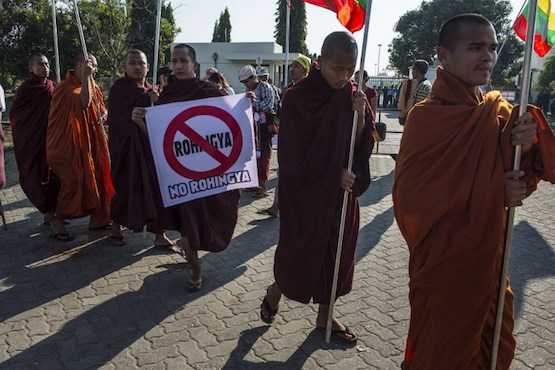
Anti-Rohingya hard-line Buddhist monks and supporters rally outside Yangon's Thilawa port as a Malaysian ship carrying relief aid for Rohingya Muslim minority arrived on Feb. 9. In Rakhine State, hard-line Buddhists are currently protesting against a government plan to give citizenship to some members of the Rohingya community. (Photo by Romeo Gacad/AFP)
Ethnic Rakhine in Myanmar are opposing the government providing citizenship to some members of the persecuted Rohingya Muslim minority.
Five-day long protests — consisting of Buddhist monks and their followers — have been held in Sittwe, the capital of Rakhine State and several townships since March 19. Myanmar's ethnic Rakhine Buddhist minority make up most of the state's 3 million people.
Zaw Win, from a civil society group in Buthidaung township in the state's north, said they are protesting the federal government's issuing of citizenship cards to members of the Rohingya community.
"The decision to do so appears to come from the top level officials so we are concerned that it may be the government's policy that is part of a long-term plan regarding citizenship which is related to our sovereignty," said Zaw Win.
Local civil society organizations say 53 Rohingya from Maungdaw and Buthidaung townships received citizenship cards in February. They say the federal government is planning to issue more.
Some 2,000 Rohingya have already been granted citizenship in Rakhine State according to a Kofi Annan-led Rakhine Advisory Commission interim report on March 16.
A state parliamentary committee was established in February after ethnic Rakhine protested the issuing of the citizenship cards. They say their Rohingya neighbors are ineligible for citizenship under the 1982 Citizenship Law.
Than Shwe, district immigration officer from Maungdaw township, said that what is currently being proposed in relation to citizenship cards is within the law.
"Concerned authorities are scrutinizing people under the 1982 Citizenship Law properly and applications are submitted to a national committee that is the main decision maker," Than Shwe told ucanews.com.
The state parliamentary committee will present a report on issuing citizenship cards to Rohingya on March 21.
The predominantly Buddhist Rakhine are worried that citizenship cards might be handed out randomly to Rohingya who they see as illegal immigrants. Those protesting are demanding that the recent 53 citizenship cards already issued be revoked. They are also demanding that action be taken against officials who issued them.
Pe Than, an lawmaker from the hard-line Arakan National party in Rakhine State, said the federal government is being pressurized by the international community into issuing the cards.
"We don't oppose those who are entitled to citizenship but we are concerned about the lack of transparency and giving citizenship cards to Rohingya who are ineligible," Pe Than told ucanews.com.
Rights groups have pushed for the Myanmar government to provide legal citizenship documents for the country's estimated 1.1 million Rohingya, whose statelessness has left them vulnerable to persecution.
Their statelessness is down to the 1982 Citizenship Law that states that only ethnic nationalities, and others whose families entered the country before 1823, are entitled to Myanmar citizenship. Based on this law, the Rohingya have been denied citizenship and accompanying rights.
Some 140,000 Rohingya are currently confined to camps in apartheid-like conditions in Rakhine after sectarian violence erupted in 2012, leaving scores dead. Many of them face severe restrictions on their freedom of movement, with limited access to health care, food and education.
More than 74,000 Rohingya fled to Bangladesh after a four-month crackdown spread terror and violence following an attack on a Myanmar security border post in the north of the state in October 2016.
Phil Robertson, deputy director of Human Rights Watch's Asia Division, said Rakhine extremists protest every time there is mention of changing the status of the Rohingya or any discussion on reforming the citizenship law.
"The Rohingya should be given citizenship, and it's time Myanmar explained to the Rakhine people that international human rights law requires the government to extend citizenship," Robertson told ucanews.com.
Muslims probably arrived in what was then the independent kingdom of Arakan (now Rakhine) as long ago as the 8th century. They were seafarers and traders from the Middle East, and were joined in the 17th century by tens of thousands of Bengali Muslims captured by the marauding Arakanese, according to an Economist report from 2015.


